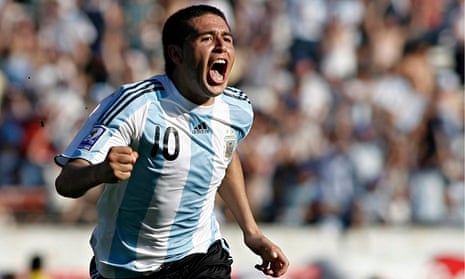As news of Juan Román Riquelme’s retirement from football spread around the globe, the traffic for the hashtag #GraciasRoman greatly increased. A revered player who made his first division debut for Boca Juniors in November 1996 at 18, he would become one of the most emblematic wearers of the iconic No10 jersey, gaining supporters and critics in equal measure as he took a rebel stand off the pitch and stayed true to his pace and style on it, no matter what.
“He broke the mould. Understanding, mental speed, respect for the game and love for the ball. And The Best Speaker Ever. I will miss you Roman,” tweeted the journalist Juan Pablo Varsky to his 579,000 followers. The veteran sports columnist Horacio Pagani described Riquelme as “the second inventor of football; the first were the English over one hundred years ago”. And the former Real Madrid player turned TV pundit Quique Wolff suggested Boca retire the No10 shirt as a mark of respect.
Players such as Riquelme embody the reason I love football. Romantic notions of the role of the No10 in Argentinian football say this is the position where the thinking takes place: the player who pauses. His critics often dwell on the fact that he did not run much (César Luis Menotti: “Since when do you need to run to play football?”) and in Argentina many of his opponents have labelled him pecho frío, literally cold-chested, apparently a phrase born among the gauchos to refer to a horse unwilling to pull a heavy cart and much used in football to describe players who go missing or fail to give the impression of making much of an effort.
In the tone of a professional obituary most of the Argentinian press have responded to his retirement by devoting ample column inches to Riquelme today, with La Nación offering a delectable infographic of his career in numbers while Olé recall his first ever interview under the title “how the legend started” .
Perhaps the pinnacle of his career was in 2006, when his presence at Villarreal put the small club on the European map, and his steady, slow leadership of a complex orchestra was at the heart of some of the most wonderful World Cup football Argentina have ever performed.
But it was not all a bed of roses; he had gone from Boca to Barcelona only to find a manager who did not want him and rarely played him. His departure from Boca had been acrimonious, as he fought hard for either a wage that reflected his contribution to the club or the possibility of moving freely to an employer who would do so. He took a public stand against the then president, now governor of Buenos Aires, Mauricio Macri – the eldest of nine siblings from a humble neighbourhood confronting the heir to one of the richest and most powerful families in Argentina.
I was particularly struck when during a photo shoot organised by Adidas several years ago he looked closely at one of the camera assistants setting up the lights and asked whether the guy had been working in Madrid on a previous session. The crew member was stunned to be registered at all, let alone remembered, as most superstars never seemed so much as to glance in the direction of the crew, he said. Riquelme has that respect for the workers around him, people often point out – a certain lack of pretens ion among the common folk.
Riquelme can be said to represent the raw essence of the potrero – the vacant lots where the little boys of Argentina nurture their desire for the ball – and would describe his working week as Monday to Saturday “because on Sundays I can’t really call it work, I enjoy playing the matches so much”. He has lived and played by his own code, which many have found unpalatable, remaining loyal to childhood friends, his neighbourhood, his family and his clubs.
After a tediously drawn-out negotiation with Boca – where he returned as the highest paid player in Argentina some years ago – he joined Argentinos Juniors, where he had started as a kid player, and secured the club’s return to the First Division last December. Even the most diehard River fans, whose hatred of the Boca emblem often clouds their judgment, found this a noble and humbling football statement.
Riquelme did not play in the 2002 World Cup – “I wasn’t right at the time. My head wasn’t right” – or in 2010, a time summarised by a Buenos Aires taxi driver thus: “If there is one thing I respect about Roman, it is how he’s the only one in this country with the balls to tell that fat Maradona to fuck off.” He never won a World Cup but was admired by the greatest players nevertheless. When Zinedine Zidane played his last match the enduring image of his final gesture on the pitch is a warm embrace with Riquelme as the two best players of the time swap shirts.
Many cling to a seeming lack of trophies to highlight his non-greatness but it was fair to describe in this very paper his return to Boca as “a triumph of poetry over prose” some years ago.
Then again, perhaps the commenter Phylomath summed up the romance of what Riquelme evokes most beautifully: “Honours probably cement greatness but lack thereof doesn’t necessarily dent a claim to the same. It’s interesting in as much as, more so than with great players, a romantic player whose beauty isn’t matched by his formal decoration is one who will, perhaps even more than any other type of player, reflect in us what we love about this game.”

Comments (…)
Sign in or create your Guardian account to join the discussion